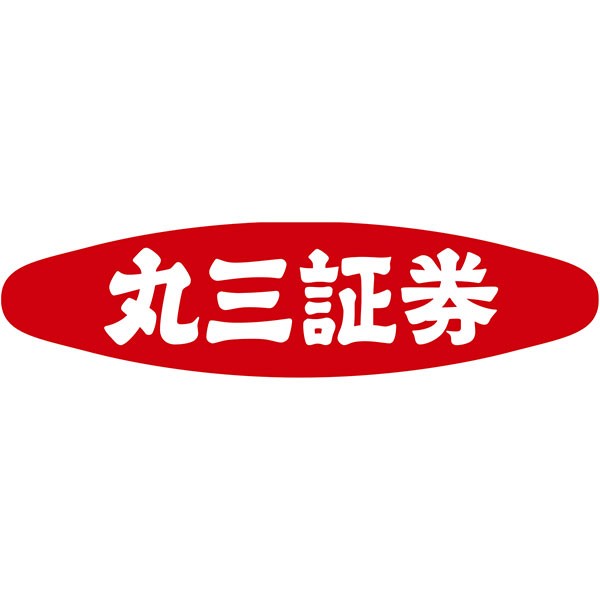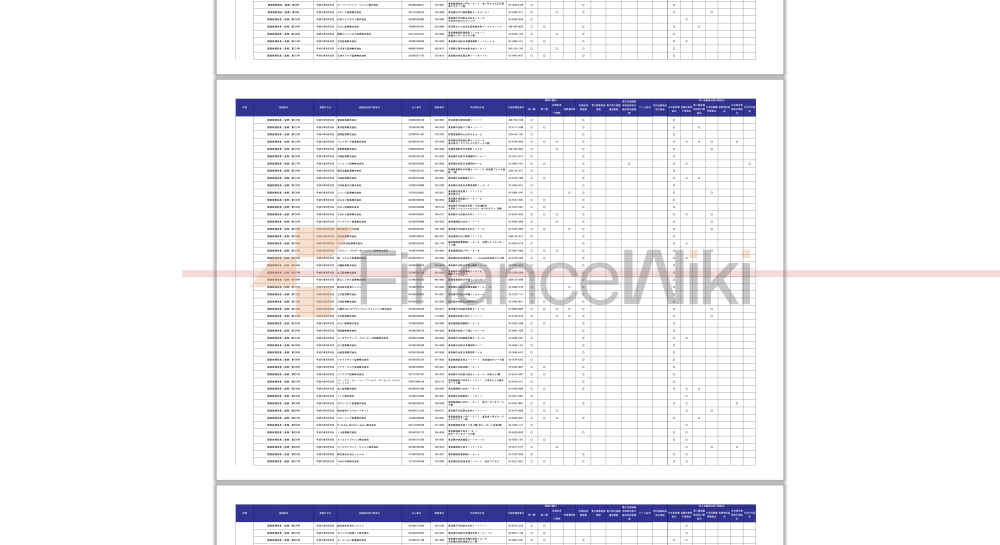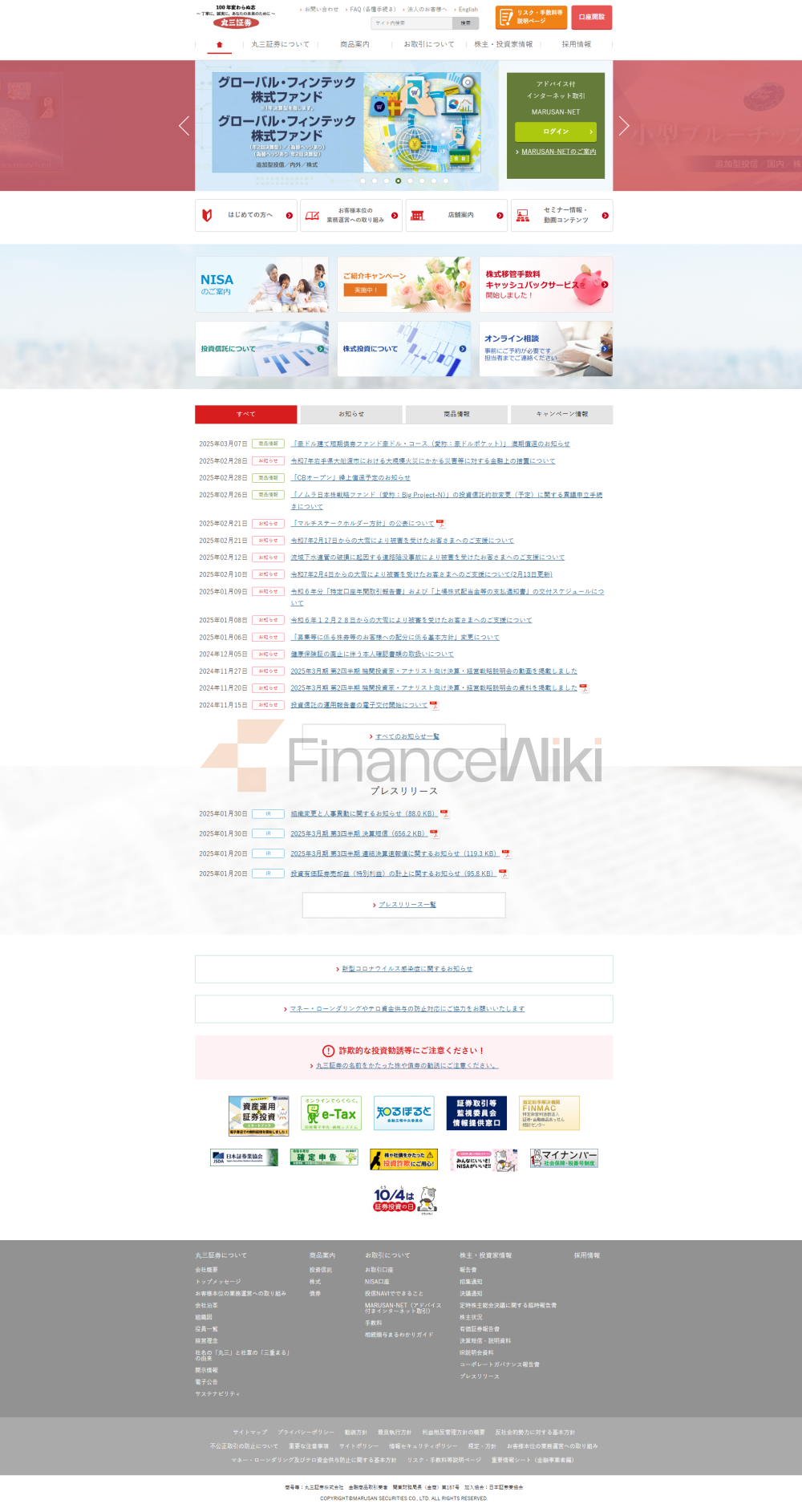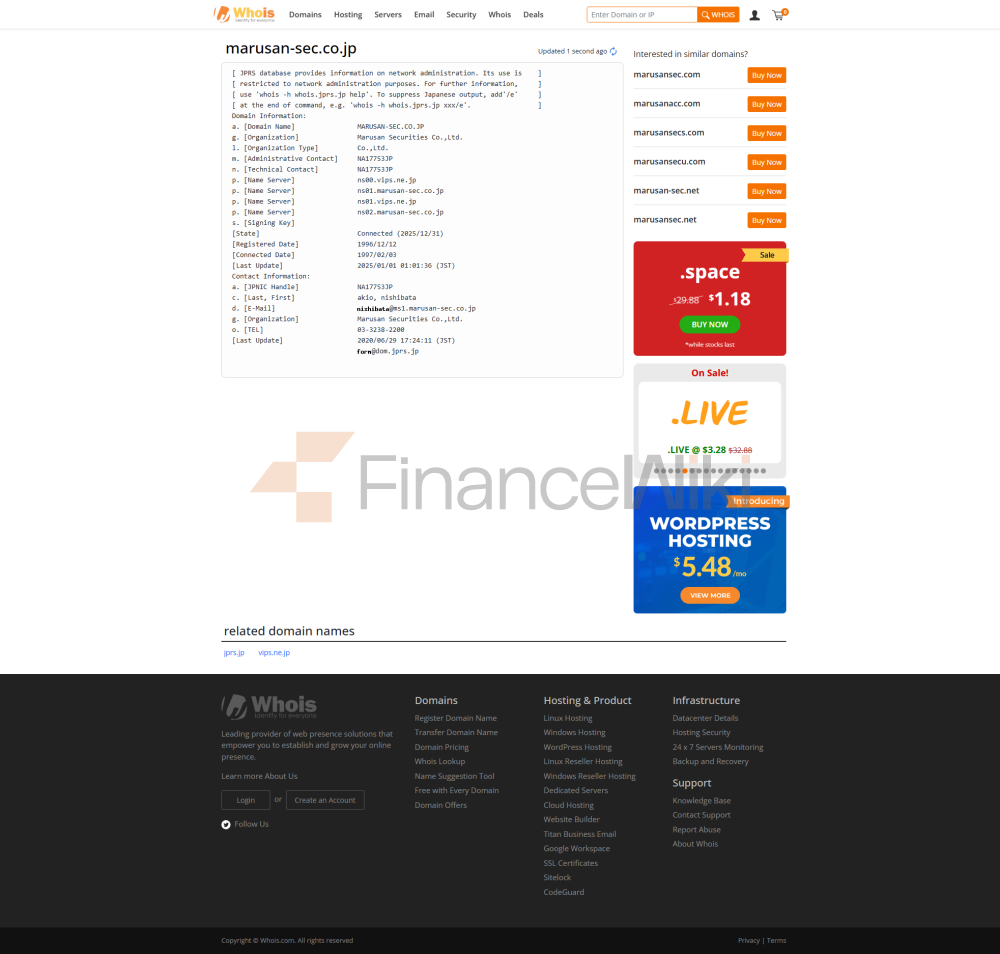Corporate Profile
Marusan Co., Ltd. Was Established In 1907 And Is A Comprehensive Financial Services Provider Located In Japan . As A Long-established Financial Institution Group, Marusan Has Extensive Experience In Securities Trading, Asset Management And Other Fields, And Is Committed To Providing Diversified Financial Products And Services To Individual And Institutional Investors. Marusan Is Headquartered In Tokyo And Has Multiple Branches Nationwide To Cover A Wide Range Of Client Groups.
Marusan's Core Business Areas Include Trading And Investment Services For Stocks, Bonds, Investment Trusts And Other Financial Products. Through Its Securities General Account And Specific Account , Investors Can Flexibly Allocate Their Assets And Enjoy Professional Investment Management Services. Marusan's Client Base Includes High Net Worth Individuals, Institutional Investors, And Small And Medium-sized Enterprises , Etc., Providing Customized Financial Solutions.
Regulatory Information
Marusan Corporation Is Regulated By The Japan Financial Services Agency (FSA) And Holds A Retail Foreign Exchange License (license Number: No. 167). This License Indicates That Marusan Has Passed Rigorous Security And Compliance Reviews To Ensure That Its Operations Meet The Highest Standards Set By The Japanese Financial Authorities.
Marusan's Regulated Status Provides Important Safeguards For Its Clients. The FSA's Regulatory Framework Covers Capital Adequacy, Risk Management, Information Disclosure And Other Aspects, Ensuring That Marusan Can Provide Clients With A Safe And Transparent Trading Environment. In Addition, Marusan's Compliance Statement Clearly Commits To Comply With All Relevant Laws And Regulations To Protect Clients' Funds And Information.
Trading Products
Marusan Offers A Wide Range Of Trading Products Covering Core Asset Classes Such As Stocks, Bonds And Investment Trusts . The Following Is A Detailed Description Of Marusan's Main Trading Products:
- Equity : Investors Can Trade Stocks In The Japanese And Global Markets Through Marusan To Invest In Publicly Listed Companies. Stock Trading Offers The Potential For Capital Appreciation And Dividend Income.
- Bond : Marusan Offers A Variety Of Bond Products, Including Government Bonds, Corporate Bonds , Etc. Bonds, With Their Stable Interest Income And Low Risk Characteristics, Have Become An Important Choice For Investors To Balance Their Portfolios.
- Investment Trust : Marusan's Investment Trust Products Bring Together Multiple Stocks Or Bonds And Are Managed By Professional Fund Managers. These Trust Products Provide Investors With Diverse Asset Allocation Opportunities.
Trading Software
Marusan Currently Does Not Provide Specialized Trading Software Or Trading Platforms. Its Trading Services Are Mainly Conducted Through Telephone Commissions And Branches . Despite This, Marusan Ensures That Clients Can Complete Transactions Conveniently Through Its Professional Sales Team And Customer Support Services.
Deposit And Withdrawal Methods
Marusan's Customers Can Deposit And Withdraw Funds Through Bank Transfer . Deposit And Withdrawal Operations Are Usually Completed Through The Customer's Designated Bank Account, And The Arrival Time Of Funds Depends On The Processing Efficiency Of The Specific Bank. Marusan Does Not Offer Other Payment Methods, Such As E-wallet Or Credit Card Payment.
Customer Support
Marusan Offers A Comprehensive Customer Support Service Covering Consulting, Complaint Handling, And Transaction Support . The Following Are The Main Channels For Marusan Customer Support:
- Telephone Support : Customers Can Call Marusan's Customer Service Hotline 0120-03-1319 To Receive Professional Consulting Services During Working Hours. Marusan's Customer Service Team Is Usually Able To Respond Quickly And Resolve Issues. Email Support : Customers Can Also Contact Marusan's Customer Service Team Via Email Toiawase03@marusan-sec.co.jp To Submit Inquiries Or Complaints.
Core Business And Services
Marusan's Core Business Includes Securities Trading, Asset Management, Investment Consulting And More. The Scope Of Its Services Covers The Diverse Needs Of Clients Ranging From Individual Investors To Large Institutional Clients.
- Securities Trading Services : Marusan Provides Clients With Efficient Stock And Bond Trading Services Through Its Branches And Professional Sales Team.
- Investment Advisory Services : Marusan's Team Of Experienced Investment Advisors Provides Clients With Personalized Investment Advice To Help Them Develop Investment Strategies That Suit Their Risk Tolerance.
- Asset Management Work : Through Its Investment Trust Products, Marusan Provides Clients With Professional Asset Management Work, Including Fund Selection, Risk Management And Portfolio Optimization.
Technical Infrastructure
Marusan's Technical Infrastructure Relies Primarily On The Efficient Operation Of Its Branches And Client Server Team. Although Marusan Does Not Provide An Online Trading Platform, It Ensures That Clients' Trading Needs Are Met In A Timely Manner Through An Advanced Telephone Trading System And A Professional Team.
Compliance And Risk Control System
Marusan's Compliance And Risk Control System Follows FSA Regulatory Requirements To Ensure The Safety Of Clients' Funds And The Transparency Of Transactions. Marusan's Risk Control System Covers The Following Aspects:
- Transaction Security : Marusan Prevents Any Unauthorized Trading Behavior Through Strict Authentication And Transaction Monitoring.
- Capital Adequacy : Marusan Maintains Sufficient Capital Reserves To Ensure Its Financial Stability Under Extreme Market Conditions.
- Risk Management System : Marusan Uses Threat And Risk Assessment And Hedging Strategies To Help Clients Reduce Investment Risk.
Market Positioning And Competitive Advantage
Marusan Occupies An Important Position In The Japanese Securities Market. Its Competitive Advantages Are Mainly Reflected In The Following Aspects:
- History And Brand Reputation : As A Century-old Financial Institution Group, Marusan Has Accumulated A Good Market Reputation And Provides Clients With Reliable Investment Services.
- Extensive Client Server Network : Marusan's Branches Across The Country Ensure That Clients Can Easily Access Financial Services.
- Professional Sales And Customer Service Team : Marusan's Team Members Have Extensive Industry Experience And Are Able To Provide Professional Consulting Services To Clients.
However, Marusan Also Faces Some Challenges, Such As Limited Trading Tools And High Commission Fees . This May Lead Some Clients To Prefer Other More Competitive Platforms.
Customer Support And Empowerment
Marusan Is Committed To Providing Comprehensive Support To Its Clients, Including Investment Education, Trading Guidance And Market Analysis . Although Marusan Does Not Provide Dedicated Educational Resources, Its Team Of Experienced Consultants Is Able To Help Clients Enhance Their Investment Knowledge And Skills Through Customized Services.
Social Responsibility And ESG
Marusan Is Active In Fulfilling Its Corporate Social Responsibility And Focuses On Environmental, Social And Governance (ESG) Issues. Marusan Contributes To The Sustainable Development Of Society By Supporting Sustainability Projects And Green Financial Products.
Strategic Cooperation Ecology
Marusan Has Established Extensive Partnerships With Other Financial Institution Groups, Industry Associations And Regulators. Through These Collaborations, Marusan Is Able To Better Serve Its Clients' Needs And Drive The Development Of The Entire Financial Industry.
Financial Health
As Of Q3 2023 , Marusan's Financial Position Remains Healthy And Its Capital Adequacy Ratio Is In Compliance With Regulatory Requirements. Marusan's Profitability Is Primarily Derived From Its Securities Trading And Asset Management Businesses.
Future Roadmap
Marusan Plans To Further Expand Its Business Scope In The Future, Exploring Opportunities In Financial Technology (FinTech) And Digital Services . By Introducing New Technology Solutions, Marusan Is Expected To Enhance The Customer Experience And Enhance Its Market Competitiveness.
In Conclusion, Marusan Is A Comprehensive Financial Services Provider Regulated By The FSA. Through Its Rich Historical Experience And Professional Service Team, It Provides Customers With A Diverse Range Of Financial Products And Services. Although Marusan Has Certain Limitations In Terms Of Payment Methods And Commission Fees, Its Brand Reputation And Market Positioning Still Make It An Important Choice For Investors.














